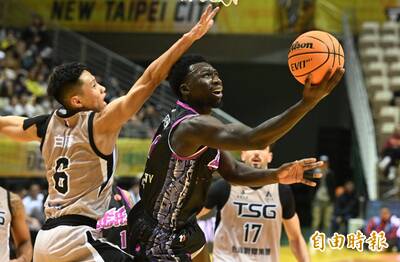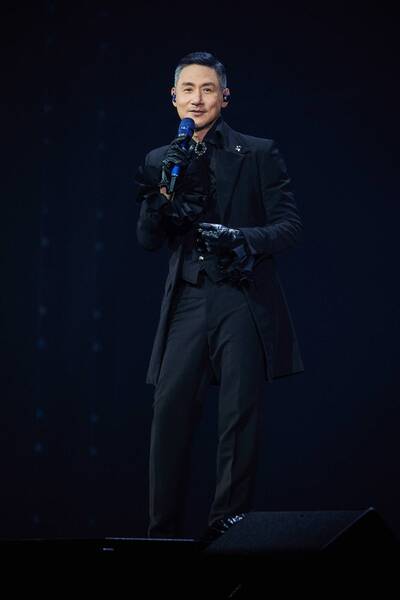《TAIPEI TIMES》 TSMC says demand remains resilient
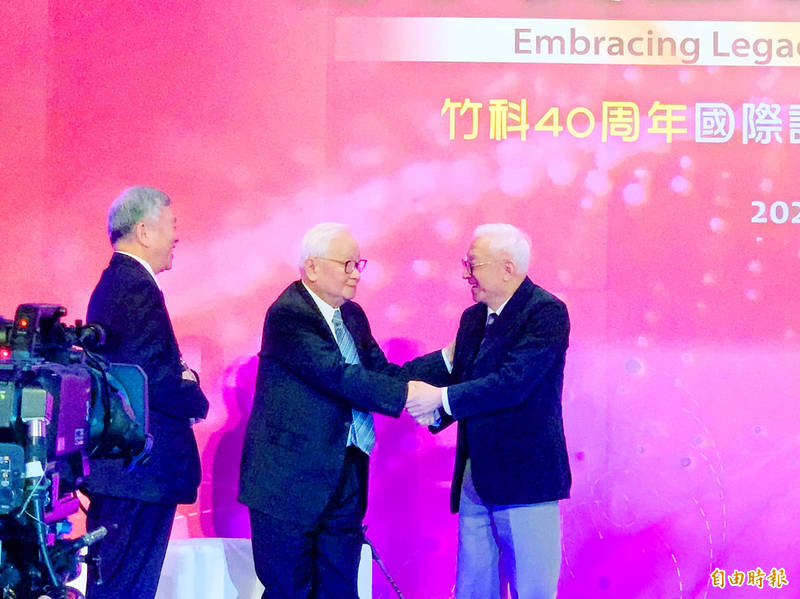
Taiwan Semiconductor Manufacturing Co founder Morris Chang, center, and United Microelectronics Corp founder Robert Tsao, right, shake hands at a ceremony in Hsinchu yesterday to mark the Hsinchu Science Park’s 40th anniversary, indicating a thaw in the two men’s feud, as Vice Premier Shen Jong-chin looks on. Photo: Hung Yu-fang, Taipei Times
BATTLE OVER? TSMC’s Morris Chang and UMC founder Robert Tsao shook hands at an event at the Hsinchu Science Park, indicating a thaw in the two men’s feud
By Lisa Wang /
Customer demand would remain resilient through the first half of next year, Taiwan Semiconductor Manufacturing Co (TSMC, 台積電) said yesterday, denying speculation that orders would be cut due to overbuilt inventory.
The Hsinchu-based chipmaker said that US-China trade disputes and the COVID-19 pandemic have changed semiconductor supply chains and redefined overbooking, or double booking.
Building higher inventory has “become a new norm for supply chains,” TSMC chairman Mark Liu (劉德音) told reporters on the sidelines of an international forum celebrating 40th anniversary of the Hsinchu Science Park (新竹科學園區), when asked about growing concern among investors over inventory corrections.
It would not be appropriate to use the previous standard to gauge supply chain inventories, Liu said.
As overbooking is not an issue, TSMC does not expect a significant reduction in factory utilization in the first two quarters of next year, Liu said in response to a question about concerns over a 20 percent cut in the utilization rate for 5-nanometer chips.
“We do not see that happening,” Liu said.
“The first half of next year will be a much better period than seasonal” cycles suggest, he said.
TSMC said in October that its customers’ overall inventory would remain above seasonal levels for a longer period, because they are concerned about potential supply disruptions amid uncertainties.
Inventory would be sustained at a high level for a longer period, the company said.
TSMC declined to answer a question about chip price hikes next year.
The Chinese-language Economic Daily News reported that the chipmaker for next year has scrapped a long-time practice of making an allowance of 3 percent for customers ordering 12-inch wafers, as its factories have reached full capacity.
Asked about reports that former TSMC joint chief operating officer Chiang Shang-yi (蔣尚義) is to rejoin Semiconductor Manufacturing International Corp (SMIC, 中芯國際), China’s biggest chipmaker, Liu said that he respects Chiang’s rights to pursue his own career.
Chiang has accepted SMIC’s offer and would serve as its vice chairman from next month, Shanghai-based news firm Voice wrote on WeChat yesterday.
Chiang told reporters that it would be easier to develop advanced chip packaging technologies and integrated circuit blocks, called chiplets, at SMIC.
Chiang said that he tried to develop those technologies when he was with Wuhan Hongxin Semiconductor Co (HSMC, 武漢弘芯).
However, he resigned as chief executive officer of the Chinese firm last month due to the company’s financial woes.
To mark the Hsinchu Science Park’s anniversary, the government presented awards to TSMC founder Morris Chang (張忠謀), United Microelectronics Corp (UMC, 聯電) honorary chairman Robert Tsao (曹興誠), MediaTek Inc (聯發科) chairman Tsai Ming-kai (蔡明介) and Acer Inc (宏碁) founder Stan Shih (施振榮).
Tsao and Chang have been avoiding each other for decades due to a feud over who invented the foundry business model in the 1970s.
Prior to giving his acceptance speech, Tsao walked up to Chang and shook hands with his rival.
Tso said that the government should strive to solve two major issues that semiconductor firms operating fabs at the Hsinchu Science Park face: water shortages and high demand for electricity.
He said that nuclear power plants should be restored to reduce carbon emissions, given the limited availability of renewable energy sources.
Building more desalination facilities would boost water supplies, he said.
新聞來源:TAIPEI TIMES
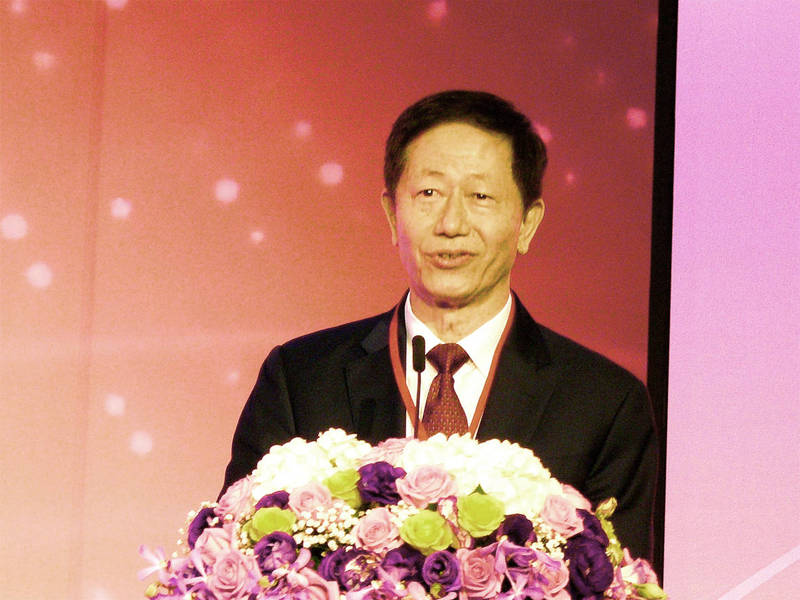
Taiwan Semiconductor Manufacturing Co chairman Mark Liu speaks at a forum celebrating the Hsinchu Science Park’s 40th anniversary in Hsinchu yesterday. Photo: CNA
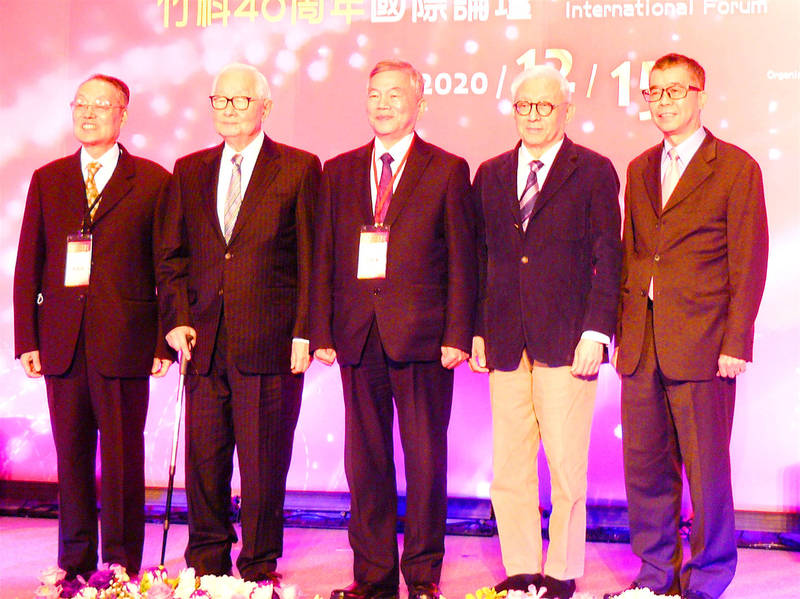
From left, Acer Inc founder Stan Shih, Taiwan Semiconductor Manufacturing Co founder Morris Chang, Vice Premier Shen Jong-chin, United Microelectronics Corp founder Robert Tsao and MediaTek Inc chairman Tsai Ming-kai pose for a photograph at a ceremony in Hsinchu yesterday to mark the Hsinchu Science Park’s 40th anniversary. Photo: CNA











